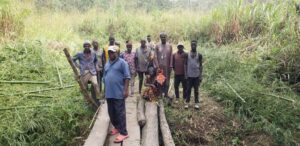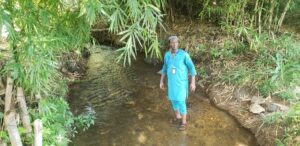For several years, Kankaylay section, Kalantuba Chiefdom in Tonkolili district has been left last in the queue of development projects. The section which comprises seven villages is far removed from the city, and badly needs development to catch up with other communities in Sierra Leone. Kankaylay section lacks safe drinking water, education, health, transport and other essential services making it difficult forresidents there.
Water and transport appears to be the worst crisis since villagers trek long distances to fetch water from unsafe and unprotected sources with 1,052ft being the farthest. On the transport front, no vehicle plies the rough and rugged terrain leading to the community except a bicycles and motor cycles.

By its looks, Kankaylay section has been on the waiting list throughout successive governments as the community has got no help from either government or non-governmental organisations, but one of their industrious sons, Chief Osman Conteh has broken barriers by bringing in humble projects to set the development train in motion.
Out of his personal coffers, three of the seven villagers have gotten boreholes to ease the water challenge which has been lingering for years. “I have done several works for the community; I have dug wells and now trying to fix the road system for vehicles to ply,” he pointed out some of his community achievements while appealing to government, non-governmental organisations and other development partners to come in.
As other villages in his section are rocky, he is working hard to have a reservoir where water could be easily accessed.

“Kankaylay community needs water, a health centre and school for the moment,” he reiterated his appeal to the authorities and humanitarian organisations. As he tries to respond to felt needs in his humble way, Chief Conteh is trying to construct a bridge that could connect his section to other communities in the chiefdom. He hopes to achieve this goal by garnering community action, but help from outsiders is also equally important.
In attempt to lay the foundation of education for present and future generations, Chief Conteh is also mobilising local effort for the construction of pre-schools in every village for a start in Kankaylay section.
“There is considerable distance from one village to the other villages, and we want to open a centre where all kids can access education as there are 40 to 50 kids in every village that are not going to school. Those who have completed, at least, secondary school education can take care of the centres initially,” Chief Conteh suggested.

It will not be the end as plans to have at least primary schools exist, and by the time the first batch of candidates for the National Primary School Examination (NPSE) NPSE are produced, a Junior Secondary School could have been established in the section.
Agriculture, the main economic activity for the villagers, is also a top priority for Kankaylay section with Chief Conteh leading the project. 15 acres of land have been set aside for cassava plantation and workers are already there.
Such investment is the only way to drive hunger away from the community. “I have spent money in the project and encourage other entities to come in,” he further appealed. Agriculture especially rice and cassava farming has always been the people’s main economic activity, and needs modernisation to enhance productivity.
Getting machines on the farms and with the help of extension workers, the desired objective will be realised. Chief Conteh’s vision is in line with government which has made agriculture their flagship project. Government officials including President Bio has been attending agricultural conferences to woo investors.

The world particularly Africa, in 2025, will go green to end hunger on the continent with Sierra Leone getting more attention. The country was labelled one of the hungriest countries in the world.
Launched in October last year, ‘Feed Salone’ initiative is a key manifesto commitment and flagship project for government. Under the scheme, government intends to be food self-sufficient and export same to other countries so that the annual US$200m spent on food imports will be reserved for other development projects.
With the ‘Feed Saone’ scheme, jobs would be created for the jobless men and women especially those in rural communities as the farms must start from the village before taken to section, chiefdom, district, regional and national to get the expected dividends.
The people of Kankaylay section, under the leadership of Chief Osman Conteh, have already kept the ball rolling and urge government and other development partners to come in.
Poised to take the people of Kankaylay section out of deprivation and suffering, Chief Conteh welcomes government, non-governmental organisations, corporate entities and other stakeholders to come into his community to take his humble development initiatives to higher heights.
In his projects, he does not cater only for the living but also want to respect the dead several sites have been identified and reserved in every village for burying the dead. In the near future, the cemeteries would be fenced to add more respect and dignity for those who will leave to eternity.
Villagers, for the past years, have been burying the dead right in their villages, most times, in their homes, an act that goes contrary to long-standing tradition of paying respect to the departed fathers and mothers of the land.
Giving a brief background on the origin of Kankaylay section chieftaincy, Chief Conteh said the formation of their ruling house dated back to the late 19th century following the capture of Bai Bureh Keblai who was resisting a hut tax pronounced by the British colonial government.
Bai Bureh’s capture meant the triumph of the tax system and Chief Conteh’s great grand-father, Fasuluku led a group of elders to the British colonial government to whom they pledged their allegiance. They expressed their willingness to cooperate with the British government in the form of taxes and other duties.
From that point, according to the Chief, the colonial government recognised Fasuluku ruling house and ordered them to collect taxes on behalf of government. Although other ruling houses exist, they have come together under the same roof and there is no system of election in the section except government says otherwise.
The section, he said, had held an election only once when a controversy over section leadership erupted. But, the aspirant, at that time, lost the election as he was never a rightful candidate. People and key stakeholders wanted to continue in a system where there is no election as they see themselves as one sharing a common destiny with Chief Conteh on the driving seat.
“For now, I am organising and supervising community project, and my candidacy will be submitted to the District Officer for approval,” he sums it up.


